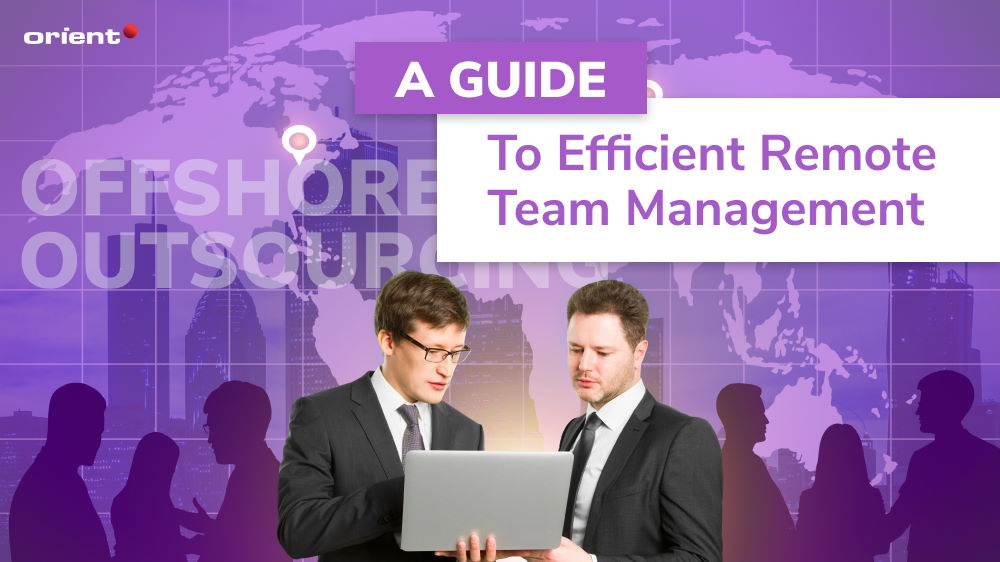Offshore Outsourcing: A Guide to Efficient Remote Team Management

Content Map
More chaptersNowadays, hybrid and remote work is no longer a new concept; on the other hand, it has become a part-and-parcel of the modern business realm even after the global pandemic officially came to an end. Especially in the IT sector, offshore software development is one of the prevalent outsourcing business models used by not only large multinational corporations. More and more businesses, startups, and small and medium-sized alike are turning to offshore outsourcing for a package of advantages they otherwise cannot gain, such as reducing costs, enhancing productivity, access to best-in-class resources, flexibility, scalability, and so forth.
If done correctly, offshore outsourcing can be your powerful move for strategic business growth and success. Otherwise, it might be a costly mistake or a project failure. Working with an offshore team and managing remote employees is always a daunting task due to various restrictions in time, space, or else; fortunately, it is not impossible if you know how to go about it.
This brief guide will help you understand how to effectively manage an offshore team by outlining the challenges and showing you how to overcome them.
What Is a Remote Development Team?

This is an alternative way to call offshore development teams or simply offshore teams. It is also known as offshore development centers (ODCs).
These interchangeable terms describe a group of IT professionals who work remotely from around the globe. For example, your company is based in the U.S., and you outsource to an offshore team in Vietnam.
A remote development team includes different key roles, ranging from software developers and project managers to web designers, data scientists, business analysts, and quality assurance (QA) engineers. The offshore team structure will vary by the nature and requirements of each project. For instance, the structure of a mobile app development team will differ from a QA team.
These remote workers are vetted and hired through an offshore outsourcing company to work on a project or ad-hoc basis. Each team member will be asked for specific skills and qualifications, depending on their respective roles.
Hiring remote developers or setting up an ODC offers business owners opportunities to leverage a wider pool of tech talent with lower labor costs. Facing the current shortage of developers in some regions, tech corporations see this approach as the best way out for their resource issues as well as their budgets.
But as stated initially, collaborating with a remote or hybrid team probably presents hindrances in the form of communication, coordination, productivity, and control.
The Inevitable Obstacles in Managing Remote Teams

Each company will have a different management style, so remote management can be a difficult journey for many business owners and managers, especially for those who aren’t familiar with the concept of offshore software development. Along the way, many challenges and obstacles arise due to geographical distance, different time zones, and varied cultures. In addition to these external barriers, internal issues within your team may also occur from time to time. Here are some of the common hurdles linked together as a chain you will encounter:
Communication-related Problems
The failure to exchange information accurately and timely between remote team members and in-house ones is not only a challenge but one of the root causes of the other difficulties you may suffer from in managing remote teams. There are many reasons behind communication stagnation and gaps.
First and foremost, geographical distance makes the biggest concern, even when you are offshore or nearshore outsourcing. As team members are not in the same geographical location, communication will cost more effort and time than usual, no doubt. In most cases, long-distance communication takes place through written messages, emails, video calls, and other project management software (such as Microsoft Teams), and it also takes longer to coordinate and facilitate tasks. As a result, delays in delivering projects may happen.
In addition, cultural differences and language barriers are next to worry about when it comes to interaction from a distance. Team members from different countries have their own set of cultural norms, social beliefs, and language nuances. Therefore, a slight misunderstanding or miscommunication can lead to a project breakdown or conflicts. This is especially true when you are outsourcing from countries whose native language is not English – you will need to ensure that all team members understand one another and the message is conveyed correctly.
Disconnection & Isolation
Remote working enables employees to work in a more flexible environment and concentrate at a higher level, but it can also generate feelings of loneliness and isolation. Oftentimes, the line of connection is cut once the weekly meetings are done.
The feeling of being disconnected from the team’s activities and being out of the loop is common among remote workers. Therefore, they tend to become less motivated and productive when they do not get positive reinforcement or feedback from their peers or managers. Moreover, lacking communication or the ability to interact with the team can cause feelings of alienation.
This seems harmless at first; however, it will get worse and wreak havoc on the relationship between team members as well as their capability to work. In the long run, it can result in an increase in absenteeism and disengagement from tasks. As remote managers, you must make sure that your remote team members feel connected to the organization and their co-workers by providing them with effective feedback and communication channels and making them part of the active conversations.
Trust Issues
Apart from the technical difficulties, establishing mutual trust among all members of the remote team is also key for effective collaboration and successful project outcomes. Trust is essential in management. Without it, your organization will not be able to build and maintain a successful remote team.
Building trust is the result of an extensive process of working together, so you cannot rush at this point even for onsite teams. Therefore, trust is difficult to build when your counterparts work from a different physical workspace at different working hours, speak a foreign mother tongue, and definitely share a different culture and values. Additionally, the lack of face-to-face interaction adds to the complexity of the matter.
This may lead to mistrust between team members and the entire team, resulting in low performance and poor productivity, which are the least you expect from an outsourced team, don’t you?
Low Morale or Burnout
In a remote environment, employee morale is the hardest thing to measure. This is partial because your remote team members often cannot enjoy the same positive vibes and camaraderie that exist in an onsite environment. In the long run, this status causes a severe impact on their morale and motivation levels, leading to a feeling of demotivation and boredom or, even worse, poor job satisfaction.
Moreover, the lack of social interaction in the office setting makes developers feel like they are missing out on company values and culture. They tend to hide and endure these innermost feelings instead of sharing. Unfortunately, the distance in geolocation does not allow you to talk and listen to them in person to figure out their problems. Needless to say, you can imagine these negative impacts may affect how you engage and manage remote workers as well as how they function.
Employees working remotely have a higher chance of facing burnout and fatigue due to heavy workloads and longer working hours. This is especially true when remote developers are not given clear expectations in the first place and are spun around by last-minute fluctuations. The state of overworking will sooner or later damage the health of your teams physically and mentally, impacting their performance and productivity in one way or another.
Performance & Productivity Issues
Remote workers can be more prone to distractions due to their environment, which consequently results in a decrease in work quality and quantity. Moreover, communication-based tasks such as preparing reports or organizing team meetings may become more difficult when colleagues are not physically present. This will make it hard for your remote team to understand each other’s tasks and deliverables in order to stay on track. Lastly, all the challenges mentioned above will join in creating a bigger loop of performance and productivity issues.
How to Manage an Offshore Development Team Efficiently

Remote team management is nothing less than an art. It demands a deep understanding of project management principles and requires a certain level of leadership skills to succeed. As a business owner or a manager, you must devote extra resources and time to manage remote teams to ensure you all are on the same page and in the right direction. Here are a few tips that may come in handy when managing employees oversea:
Set Up & Maintain a Seamless Line of Communication
Communication is the key to efficient collaboration and management, so secure it first and foremost. This is something you should have come prepared for when you first plan to hire offshore developers.
Businesses should create an open and interactive environment where all involved can connect easily and effectively with each other at any given time.
To facilitate a seamless communication workflow like that in the technical aspect, you can leverage different collaboration tools and techniques, such as video conferencing tools, project management tools, and on-screen collaboration software. These help to foster better coordination between teams which will be more efficient in the long run.
In addition, scheduling weekly team meetings to catch up and discuss progress is also encouraged. It will help your remote team feel included and connected, even when physically miles apart.
Assign a Remote Management Role
Most remote developers work independently; thus, it will be much more difficult for you to manage them in a “headless” team. Since you will not be able to see your oversea employees in person very often, you should put a remote leader or manager in charge on your behalf. This person will be responsible for managing remote teams from a close distance and communicating with them on a day-to-day basis.
By assigning this “middleman” to oversee and coordinate the workflow of all remote developers, it will make managing remotely easier in terms of performance, productivity, and quality. This person will also do direct reports to you, providing insights and feedback based on their own observations through regular conference calls.
To ensure this role can be effectively carried out, you need to assign corresponding authority to it as well. This includes giving access to resources, assisting with problem-solving, and setting up clear objectives on a timeline.
Respect the Work-life Balance Culture
There is a visible boundary between the business and personal life when you work onsite; however, it tends to blur when it comes to remote working. Because of the lack of physical presence, most companies or managers tend to make unreasonable demands on remote employees, such as working outside of normal hours and having an “always-on” status.
This is a huge mistake that will eventually exhaust your offsite team, leading them to a loss in motivation over time. It is important for you to establish a healthy work-life balance and expectations with your staff so they can stay productive while keeping themselves away from burnout. Also, make sure your offshore developers have sufficient leave time each year so they can take breaks from stressful situations from time to time.
By respecting the culture and schedule of remote workers, you are also creating an atmosphere of trust, respect, and understanding for both sides. This will bring better collaboration culture in the long run and help improve performance. Managers should also pay attention to any signs of stress or anxiety from their remote employees as these can often lead to burnout a lot faster than what happens with conventional teams.
Define Roles & Clear Expectations
Nothing is worse than a disorganized and haphazard workflow. It will not only lead to massive inefficiency but also create huge confusion for your remote workers. As the manager of an offshore team, you should be especially mindful of having clear roles and expectations for each team member and always track what needs to be done and guide your remote employees toward the finish line.
Therefore, the process of setting up a clear-cut structure should be done carefully. It involves assigning roles to your offshore developers and explaining what their responsibilities are in advance. There should also be frequent check-ins with them to ensure everyone is on track with performance goals and objectives set by the company. The more you make clear at this point, the easier for you to track productivity later on. Choose a suitable project management tool to help you ease the process of monitoring the performance of your team members.
Conduct Team Building Activities & Regular Check-ins
When managing a remote team, it is also essential to provide emotional support and build a strong bond between the parties. This can be done through team-building activities and regular check-ins.
You can schedule virtual hangouts, such as online non-business group meetings or team chats, for the entire team to get together, discuss ideas, and share experiences besides work-related issues. In this way, they can get to know each other casually, which will help to tighten the bond between them when working. Do not forget to encourage team members to use video calls instead of only messages.
Additionally, managers should conduct regular check-ins with all remote workers. This not only helps to stay up-to-date with their progress but also provides a chance for managers to connect with each team member and make sure everyone is comfortable in their working environment. Regular check-ins help to identify any problems or confusion that the offshore developers may be facing, so you can address them quickly. During the one on one time, employees can also share their ideas and get feedback to keep the team’s performance at its peak.
Last but not least, you should also stipulate the ground rules for your teams from the start to maintain a professional relationship and show people how to cooperate effectively. This will help to optimize their workflow and build a healthy work culture. Given that everyone is working in different time zones, it is essential to come up with agreed-upon hours of availability for the team members and be flexible enough when needed. This will help them stay organized and productive while maintaining a healthy work-life balance.
In short, remote team management is such a daunting task; however, it is not necessarily tiresome in that way if you partner with the right outsourcing company for offshore development teams. Come to Orient Software for the most reliable offshore development services in Vietnam. We have been providing top-notch IT solutions for a wide range of businesses and industries while being fully committed to delivering the best results to our clients. With years of experience in managing remote teams, you can trust us to bring the most satisfaction. Contact us now to get started.







